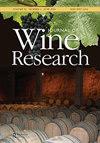Expert reviews uncorked: Contrasting the differences in the language used in online reviews of white and red wine
Q2 Agricultural and Biological Sciences
引用次数: 0
Abstract
ABSTRACT Consumers today are well accustomed to a digitized consumer journey, actively seeking social proof from online customer reviews to guide consumption decisions. These review platforms have been shown to be influential in guiding consumer behavior across many product and service categories. The language used to describe products on review platforms is of importance, given its potential to influence consumer perceptions and purchase intentions. Despite this, little attention is placed on the language used in reviews. In order to address this gap, this research sought to analyze and contrast the language used in online customer reviews within the wine category, by contrasting the lexical characteristics of reviews of white and red wine. The research made use of 2917 online wine reviews for four different varietals, two red wine (cabernet sauvignon and shiraz) and two white wine (chardonnay and sauvignon blanc) varietals. The Linguistic Inquiry and Word Count (LIWC) software was used to conduct a lexical analysis, with the results indicating both similarities and differences between the reviews of red and white wine varietals. The results provide insight into the lexical components of the wine reviews and the implications that these bear on the perceived usefulness of the review.专家评论开放:对比白葡萄酒和红葡萄酒在线评论中使用的语言差异
摘要如今的消费者已经习惯了数字化的消费之旅,他们积极从在线客户评论中寻求社会证据,以指导消费决策。这些评论平台已被证明在指导许多产品和服务类别的消费者行为方面具有影响力。评论平台上描述产品的语言很重要,因为它有可能影响消费者的认知和购买意图。尽管如此,很少有人关注评论中使用的语言。为了解决这一差距,本研究试图通过对比白葡萄酒和红葡萄酒评论的词汇特征,分析和对比葡萄酒类别中在线客户评论中使用的语言。这项研究利用了四个不同品种的2917条在线葡萄酒评论,其中两个是红酒(赤霞珠和设拉子),两个是白葡萄酒(霞多丽和长相思)。语言查询和字数统计(LIWC)软件用于进行词汇分析,结果表明红葡萄酒和白葡萄酒品种的评论之间既有相似之处,也有不同之处。研究结果深入了解了葡萄酒评论的词汇成分,以及这些成分对评论有用性的影响。
本文章由计算机程序翻译,如有差异,请以英文原文为准。
求助全文
约1分钟内获得全文
求助全文
来源期刊

Journal of Wine Research
Agricultural and Biological Sciences-Horticulture
CiteScore
2.40
自引率
0.00%
发文量
10
期刊介绍:
The Journal of Wine Research is an international and multidisciplinary refereed journal publishing the results of recent research on all aspects of viticulture, oenology and the international wine trade. It was founded by the Institute of Masters of Wine to enhance and encourage scholarly and scientific interdisciplinary research in these fields. The main areas covered by the journal include biochemistry, botany, economics, geography, geology, history, medicine, microbiology, oenology, psychology, sociology, marketing, business studies, management, wine tasting and viticulture.
 求助内容:
求助内容: 应助结果提醒方式:
应助结果提醒方式:


